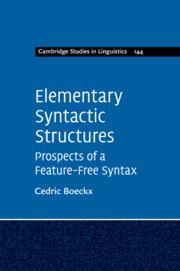- Inici
- Departament
- Nous estudiants
- Docència
- Grau
- Postgraus, Màsters i Doctorat
- Mobilitat i intercanvi
- Pla d’acció tutorial (PAT), Filologia Catalana
- Pla d'acció tutorial (PAT), Lingüística General
- Sortides professionals (Filologia Catalana)
- Sortides professionals (Lingüística General)
- Estudiants amb necessitats específiques
- Aula de Literatura i Meditació
- Horaris de visita
- Recerca
- Publicacions
- Actualitat
Elementary Syntactic Structures. Prospects of a Feature-Free Syntax

Any
2019
Col·lecció
Cambridge Studies in Linguistics
Editorial
Cambridge University Press
ISBN
9781316645376
Most syntacticians, no matter their theoretical persuasion, agree that features (types or categories) are the most important units of analysis. Within Chomskyan generative grammar, the importance of features has grown steadily and within minimalism, it can be said that everything depends on features. They are obstacles in any interdisciplinary investigation concerning the nature of language and it is hard to imagine a syntactic description that does not explore them. For the first time, this book turns grammar upside down and proposes a new model of syntax that is better suited for interdisciplinary interactions, and shows how syntax can proceed free of lexical influence. The empirical domain examined is vast, and all the fundamental units and properties of syntax (categories, parameters, Last Resort, labelling, and hierarchies) are rethought. Opening up new avenues of investigation, this book will be invaluable to researchers and students in syntactic theory, and linguistics more broadly.
- Opens up new avenues of research in the context of language variation
- Shows how syntax transformed conceptual and sensorimotor abilities inherited from our primate mind and outlines evolutionary scenarios that combine human uniqueness and Darwinian descent with modification
- Shows how linguistic theory can be guided by biolinguistic considerations
Table of Contents
Preface
Abbreviations and symbols
1. Biolinguistic concerns
2. Syntactic order for free: merge α
3. Trusting in the external systems: descent with modification
4. Elaborate grammatical structures: how (and where) to deal with variation
5. Interdisciplinary prospects
Appendix 1. Déjà vu all over again?
Appendix 2. Switching metaphors: from clocks to sandpiles
Appendix 3. More on the loss of syntactic variation
Bibliography
Index.
dijous, 12 setembre, 2019 - 09:47

